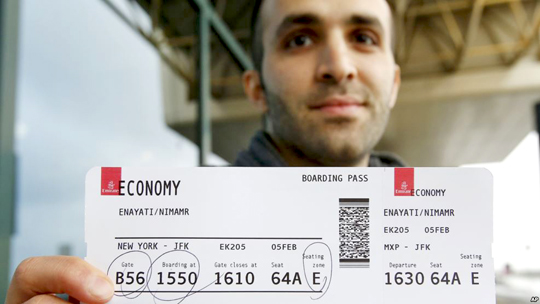Chicago, Feb 6: Visa holders from seven majority-Muslim countries who were turned away from the United States due to President Donald Trump's travel ban are hoping to make it through a narrow window opened by legal challenges.

The federal appeals court in San Francisco denied Trump's effort to immediately reinstate the ban+ early on Sunday. For now, it remains blocked by a judge's temporary restraining order, and federal officials have told their staffs to comply.
Advocates weren't taking any chances, telling people who could travel to get on the earliest flights they could find after the week-old ban was blocked Friday by US District Judge James Robart in Seattle.
"We're telling them to get on the quickest flight ASAP," said Rula Aoun, director of the Arab American Civil Rights League in Dearborn, Michigan. Her group sued in federal court in Detroit, challenging Trump's executive order as unconstitutional.
Protesters sought to keep up the pressure, gathering in Denver and other US cities to demonstrate against the ban. Meanwhile, legal advocates waited at airports in case anything went wrong with new arrivals.
Renee Paradis was among 20-25 volunteer lawyers and interpreters who stationed themselves inside John F Kennedy's Terminal 4 in New York in case anyone needed help. They were carrying handmade signs in Arabic and Farsi "that say we're lawyers, we're here to help. We're not from the government," Paradis said.
"We're all just waiting to see what actually happens and who manages to get through," she said.
Some people have had to make hard choices.
A Yemeni family expected to arrive at John F Kennedy International Airport on Sunday from Egypt after leaving two of their four children behind. The father and two children are US citizens and the mother has an immigrant visa, but the other two children don't have their papers yet.
"They just don't want to take a chance of waiting," she said.
Cairo airport officials say a total of 33 US-bound migrants from Yemen, Syria and Iraq have boarded flights on their way to the United States.
The officials said the 33 had not previously been turned back, but were rather migrants who are rushing to take advantage of the window offered by the court ruling. The officials spoke on condition of anonymity because they were not authorized to speak to the media.
The State Department has advised refugee aid agencies that refugees who had been scheduled to travel before the order was signed will now be allowed into the US. A State Department official said in an email obtained by The Associated Press that the government is "focusing on booking refugee travel through February 17," with arrivals resuming as soon as Monday.
US officials have said up to 60,000 foreigners had their visas "provisionally revoked" to comply with Trump's order. Confusion during the rollout of the ban initially found green card holders caught in travel limbo, until the White House on Wednesday clarified that they were not included in the ban.
Even so, green card holder Ammar Alnajjar, a 24-year-old Yemeni student at Southwest Tennessee Community College, cut short his planned three-month visit with his fiancee in Turkey, paying $1,000 to return immediately when the ban was lifted.
"I got to study. I got to do some work," said Alnajjar, who arrived at JFK on Saturday. He said he fled civil war in Yemen and moved to the US from Turkey in 2015.
Despite the suspension of the travel ban, some airlines were slow to let aboard people from the seven countries.
Royal Jordanian Airlines, which operates direct flights from Amman to New York, Chicago and Detroit, said it would resume carrying nationals from the seven countries as long as they presented a valid US visa or green card.
A Qatar Airways spokeswoman said the airline would begin boarding travelers from Iraq, Syria, Sudan, Libya, Yemen, Iran and Somalia. But immigration attorney Julie Goldberg said a Qatar Airways representative told her that immigrants from the seven countries were still not allowed to fly Saturday afternoon.
Goldberg said she was trying to arrange flights for dozens of Yemeni citizens who have immigrant visas and were stranded in the African nation of Djibouti.
She said a supervisor at Turkish Airlines told her that people holding immigrant and non-immigrant visas from the seven countries still were being banned unless they had a special email from the US Customs and Border Protection.
A 12-year-old Yemeni girl whose parents and siblings are US citizens living in California was finally allowed to depart after "an hour-and-half of fighting" with officials, Goldberg said. It was unclear when she would arrive.
"Her mother is on pins and needles ... her father is on the plane with her," Stacey Gartland, a San Francisco attorney who represented the girl, said in an email.
Lebanon's National News Agency said airlines operating out of Beirut have begun allowing Syrian families and others affected by the ban to board US-bound flights. Beirut has no direct flights to the US so travelers usually transit through Europe.
Many refugees awaited word on their fates.
Somali refugee Nadir Hassan said about 140 refugees were sent back to Dadaab refugee camp and it was unclear if or when they could travel. They had been expected to settle in the US this week and had been staying at a transit center in Nairobi.
"I was hoping to start a new life in the US" Hassan said. "We feel bad."
In Tehran, the semi-official Fars news agency reported that a ban on US wrestlers has been lifted following the judge's ruling, allowing them to take part in the Freestyle World Cup later this month in the Iranian city of Kermanshah.




Comments
Add new comment